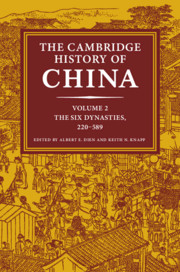Book contents
- The Cambridge History of China
- Copyright page
- Contents
- Figures and Tables
- Maps
- Preface
- Six Dynasties Chronology
- Introduction
- Part 1 History
- Part 2 Society and Realia
- Part 3 Culture, Religion, and Art
- Chapter 22 Confucian Learning and Influence
- Chapter 23 Qingtan and Xuanxue
- Chapter 24 Buddhism
- Chapter 25 Daoism
- Chapter 26 Popular Religion
- Chapter 27 The World of Prose Literature
- Chapter 28 The World of Poetry
- Chapter 29 Art and Visual Culture
- Chapter 30 Music
- Abbreviations of Frequently Cited Primary Sources
- Journal Titles: Acronyms (single-word titles do not use acronyms)
- List of Asian Journal Titles
- Primary Texts
- General Bibliography
- Glossary–Index
Chapter 22 - Confucian Learning and Influence
from Part 3 - Culture, Religion, and Art
Published online by Cambridge University Press: 28 October 2019
- The Cambridge History of China
- Copyright page
- Contents
- Figures and Tables
- Maps
- Preface
- Six Dynasties Chronology
- Introduction
- Part 1 History
- Part 2 Society and Realia
- Part 3 Culture, Religion, and Art
- Chapter 22 Confucian Learning and Influence
- Chapter 23 Qingtan and Xuanxue
- Chapter 24 Buddhism
- Chapter 25 Daoism
- Chapter 26 Popular Religion
- Chapter 27 The World of Prose Literature
- Chapter 28 The World of Poetry
- Chapter 29 Art and Visual Culture
- Chapter 30 Music
- Abbreviations of Frequently Cited Primary Sources
- Journal Titles: Acronyms (single-word titles do not use acronyms)
- List of Asian Journal Titles
- Primary Texts
- General Bibliography
- Glossary–Index
Summary
During the Eastern Han (25–220), Confucianism had become the guiding philosophy of both governance and social life. But as political infighting, peasant rebellions, and warlordism tore apart the Han Empire, many intellectuals lost confidence in Confucianism and looked to other systems of meaning for guidance and solace. To make sense of their chaotic, dangerous, and evanescent world, some turned to xuanxue (Dark Learning), or to Buddhism, or to organized Daoism. Based on these changes, Western scholars have concluded that, at the end of the Eastern Han, Confucianism was passé and its influence was in steep decline. If the fall of the Han state truly discredited Confucianism and educated men looked for meaning elsewhere, how, then, did Confucianism survive? Why did early medieval literati continue to view Confucianism as valuable? Admittedly, Confucianism was not important in the philosophical salons; it offered little in terms of the current understanding of ontology or metaphysics, nor did it help secure one’s postmortem welfare.
- Type
- Chapter
- Information
- The Cambridge History of China , pp. 483 - 510Publisher: Cambridge University PressPrint publication year: 2019

